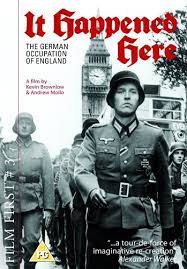
“The appalling thing about Fascism is that you’ve got to use Fascist methods to get rid of it.” “We’ve got to fight Fascism because it’s a disease of the mind. When you fight a disease you often use its own germ for inoculation.”
In 1940, Germany invaded Great Britain. By 1944 the resistance movement has been largely defeated by German forces. The citizens of Great Britain have, for the most part, settled down into a complacent way of life and a fervent hope of some sort of normalcy. Trouble in the Ural Mountains of Russia required that German troops be sent to Western Europe to handle the situation. The British territory is left with some German soldiers, local volunteers and the Schutzstaffel or SS to keep the peace.
Pauline (Pauline Murray) is forced to evacuate from her village and relocate to London. Before she leaves she witnesses an attack on the Germans by British partisans. Some of Pauline’s friends are killed during the attack. Pauline is a nurse and is sick of all the political issues in Britain and would prefer not to join any organizations, however, in order to get a job she is forced to join the Immediate Action Organization. The IAO is a semi-military medical corps that retrains her, based on German ideology, as an ambulance attendant. Her training is hard and constant. Slowly Pauline is being indoctrinated into the idea of National Socialism.
Pauline visits an old friend, Dr. Richard Fletcher (Sebastian Shaw) and his wife Helen (Fiona Leland). Pauline finds out that Fletcher is an antifascist who is treating a severely injured Partisan. When she sees Dr. Fletcher, his wife and small son arrested Pauline becomes conflicted and begins to question authority. The IAO finds out that Pauline knew the Fletchers. To punish her for associating with known antifascists she is transferred to a hospital out in the country taking care of workers who have contracted tuberculosis. At first it seems an idyllic job, until she learns that she is part of a euthanasia program. They aren’t taking care of people, they are killing them.
“It Happened Here” was released in 1964 and was directed by Kevin Brownlow and Andrew Mollo. It is a British science fiction war film. The movie was written by Kevin Brownlow and Andrew Mollo with assistance from Dinah Brooke. It is an amateur production.
I found it strange that this is the subject that two teenagers would pick to make a film about but it does reflect the worst horror movie possible. It is a stark and dark film about what, under certain circumstances, could have been the future. I’m afraid there will be few lessons, if any, learned from this experiment.
Kevin was nineteen and Andrew sixteen when they began working in 1956 on the film. It wasn’t completed until 1964 and was then released in the Cork and Mannheim film festivals. The film was then released in 1966 in the UK and U.S. The film was shot in black and white to give it a newsreel feel even though no stock footage was used.
When he found out about the project Stanley Kubrick was intrigued. He donated film stock from Dr. Strangelove to Brownlow to help him finish the film. BBC radio announcers Alvar Lidell and John Snagge volunteered to voice reconstructed newsreels and radio broadcasts. Director Tony Richardson helped to finance the final production.
Ultimately the film had approximately nine hundred volunteer cast members, including a few professional actors. Some of the extras were members of British science fiction fandom. Some of the actors who played British fascists were actually former members of the British Union of Fascists. Ex-German servicemen portrayed SS and Wehrmacht soldiers and airmen.
The film was distributed by United Artists. The filmmakers had problems with them concerning a mostly improvised segment of the film where actual members of the National Socialist Movement answered questions from Pauline and other nurses concerning the Nazi political view. United Artists felt that the scene allowed Nazis a platform to put forward their propaganda views on various topics as though they were legitimate and reasonable. That part of the film was cut from the original release. Thirty years later it was restored when Kevin regained the rights to the movie.
Others had problems with the film portraying British citizens as collaborators. The British Jewish Board of Deputies accused the filmmakers themselves of being anti-Semitic, despite the film’s strong anti-Nazi theme.
Kevin Brownlow later became a prominent film historian, and Andrew Mollo a leading military historian.

